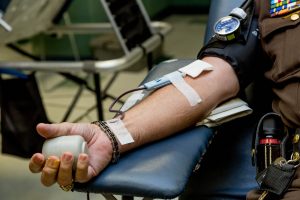Celebrating American Heart Month by Donating Blood!
February has been American Heart Month. To raise awareness about cardiovascular health, we’d like to provide resources and information about donating blood.
Last summer, the Red Cross announced it would start testing blood donations for COVID-19 antibodies. They still offer this service. To book an appointment with the Red Cross, sign up here and schedule your visit. One facility is here on Tremont Street, near the COVID testing site, but you have to schedule an appointment because no blood donation sites take walk-in visits.
If you don’t want to donate blood, you may donate platelets or plasma instead. This is a longer procedure where the nurses filter the blood, and makes some patients feel less tired. In order to donate blood, donors are required to be:
- Over 16 years old

Photo by LuAnn Hunt on Unsplash - Over 110 lbs.
- Feeling well and in good physical health, with no fever for 7 days prior
To prepare for a blood donation, donors should:
- Eat a healthy meal and drink an extra 16 oz. of water before your appointment
- Bring a photo ID
- Arrange for a ride home so you’re not behind the wheel after your appointment
During your appointment, the Red Cross nurses will test your hemoglobin levels and ask you a series of questions about your travel habits, sexual behaviors, and medications. After your donation, you will have to stay on site, in a rest area, for 15-20 minutes. Here, you can hydrate yourself, eat snacks to increase your blood sugar, and arrange your ride home.
After donating blood, the Red Cross recommends no intense physical activity for 24 hours, and no alcohol or recreational drugs for 48 hours. We recommend you take the rest of the day to nap, eat another hearty meal, and bask in your act of generosity for the day. In the meantime, the center will test your blood for COVID-19 antibodies, among other diseases like HIV or Hepatitis B.
The benefactors of blood donations include cancer patients, serious injuries, people with chronic anemia, and more. Pints of blood are shipped all over the country. Your blood can even be split among patients, where one person receives the white blood cells, and another receives the platelets. The Red Cross, with your permission, will even notify you when your blood is sent to another hospital for use.
And donating blood has its benefits. It lowers your blood iron stores; your liver cannot handle high levels of iron in the body. Some studies say that donating blood reduces your chances of cancer or a heart attack. You may find out about health concerns, like high blood pressure or an infection, during the donation. My favorite part are the free snacks.
